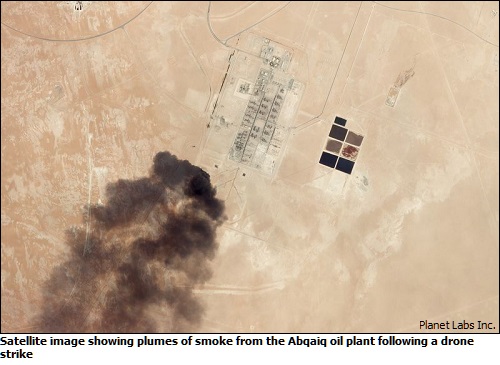
|
|

|
|
| April 25, 2024 |
|
Oil prices spike after attack on Saudi facilities hits global supply 
WASHINGTON - Oil prices spiked shortly after trading began Monday following a weekend attack on Saudi Arabia's oil facilities that knocked out more than 5 percent of global oil supply and halted output of more than half of the kingdom's daily exports.
Brent crude futures jumped nearly 20 percent, the biggest intraday percentage gain since the Gulf War in 1991, to a session high of $71.95 a barrel at the opening, while U.S. crude futures surged more than 15 percent, to a session high of $63.34 a barrel. Both benchmarks rose to the highest since May. State oil giant Saudi Aramco said the attack on Saturday would cut output by 5.7 million barrels of crude oil per day. It gave no timeline for output resumption, only saying that work to restore production is underway. It said on Saturday it would provide an update in 48 hours. As news of the attacks broke, Secretary of State Mike Pompeo offered reassurances that the United States would work with its partners and allies to make sure energy markets remain well supplied. President Donald Trump said on Sunday that the U.S. is “locked and loaded” for a potential response. He also tried to assuage the fears, saying he had authorized the release of oil from the U.S. Strategic Petroleum Reserve (SPR), if needed, in a quantity to be determined to keep the market well-supplied in the aftermath of the attack. U.S. Energy Secretary Rick Perry also said on Monday that the oil market is resilient and will react positively to the attack on Saudi Arabia's oil industry. But the attack has added to anxiety about the stability of the world's oil reserves. The International Energy Agency (IEA) provided NBC News with data that shows that the disruption caused by Saturday's attacks surpasses that created by Iraq's invasion of Kuwait in 1990 and the 1979 Islamic Revolution in Iran. "Saudi Arabia has been a very reliable supplier of oil in the world," Jim Burkhard, who heads crude oil research for IHS Markit, told The Associated Press. This attack is "adding a geopolitical premium back into the price of oil,” he said, meaning prices would rise because of worries about more unrest and possible future attacks jeopardizing global oil supplies. On Saturday, Yemen's Iran-backed Houthi rebels took responsibility for the attacks on Saudi oil infrastructure, saying their drones struck Saudi oil-processing facilities at Abqaiq and Khurais. However, the U.S. pointed the finger at Iran, another major oil producer and geopolitical player, with Pompeo saying there was “no evidence the attacks came from Yemen.” Iran has denied any responsibility. While there has been no immediate threat of a military response from Saudi Arabia or the U.S., the uncertainty around any possible retaliation is roiling the markets. Experts agree that the long-term effect on oil prices will depend on how fast Saudi Arabia restores production. Saudi oil field attacks mean you will likely pay more at the pump Saturday’s drone attack on oil fields and a key production facility in Saudi Arabia could mean drivers will be paying as much as 25 cents more per gallon in the short term, and economists predict that further tensions in the Middle East could lead to a more sustained elevation in oil prices. “I think oil prices will be elevated for weeks, if not months. A risk premium will likely stick around for quite some time,” said Patrick DeHaan, head of petroleum analysis at GasBuddy.com. “This is incredibly serious,” said Tom Kloza, global head of energy analysis at Oil Price Information Service. “Before Saturday, the geopolitical risk premium was measured in a few dollars per barrel and one could even argue that there was a geopolitical risk discount tied to the trade war. Now, we are likely to see a risk premium of $10 to $20 per barrel,” he said. American drivers can expect to pay between 10 cents and 25 cents more per gallon in the near term, analysts estimated. The biggest X factor is how long it takes Saudi Arabia’s state-owned Saudi Aramco to repair and bring its facilities back online. CNBC reported that the goal was to have about one-third of the production restored Monday. (Source: NBC News) Story Date: September 17, 2019
|